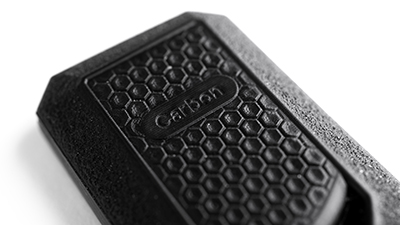Digital manufacturing company Carbon, Silicon Valley, California, has introduced its latest innovation in materials, a new resin called RPU 130. With a combination of properties, RPU 130 aims to fill the need for a tough, rigid and high temperature additive manufacturing material suitable for rigorous applications in such industries as automotive.
RPU 130 also is partially derived from plants, addressing the growing demand for more sustainable, high-performance materials.
Rigid polyurethane is Carbon’s most versatile rigid material family. Carbon developed RPU 130 to address the need for superior impact resistance and dimensional stability at elevated temperatures that no additive material could address. In addition to automotive, RPU 130 is highly relevant for a wide range of industrial and consumer product applications such as air ducts and brake caliper covers for vehicles, sunglasses, tool housings and device enclosures. RPU 130 combines some of the best characteristics of Carbon’s RPU 70, FPU 50 and EPX 82 resins into a single, tough, heat and impact resistant material, similar to ABS, unfilled nylon or polypropylene.
RPU 130 is the latest dual-cure engineering resin made exclusively for Carbon Digital Light Synthesis™ technology. Its combination of performance attributes makes this new material unique for additive manufacturing and more comparable to unfilled thermoplastics.
Producing RPU 130 required innovations not only in material science but also software and hardware. In addition to the new dual-cure resin, Carbon offers a new heated C5 Cassette required for use with the material, a new dispensing solution and tuning via software to ensure great end-use products.
In addition to new hardware and software components, RPU 130 was made with environmentally sustainable raw materials. Carbon partnered with DuPont Tate & Lyle Bio Products to use Susterra® propanediol, a 100% bio-based building block that delivers high performance across a wide variety of polymers, coatings and ink applications.
Compared with conventional petroleum-based alternatives, Susterra® propanediol produces 48% less greenhouse gas emissions and uses 46% less nonrenewable energy from cradle-to-gate. Nearly 30% of RPU 130 is composed of this plant-based material. Going forward, Carbon is firmly committed to building on this work by continuing to expand efforts to achieve more sustainable practices through the use of advanced, high-performance, bio-based materials like Susterra® propanediol.
Carbon RPU 130 is available via Carbon’s resin store in the US, Canada, and Europe. For more information, visit www.carbon3d.com and www.duponttateandlyle.com.





